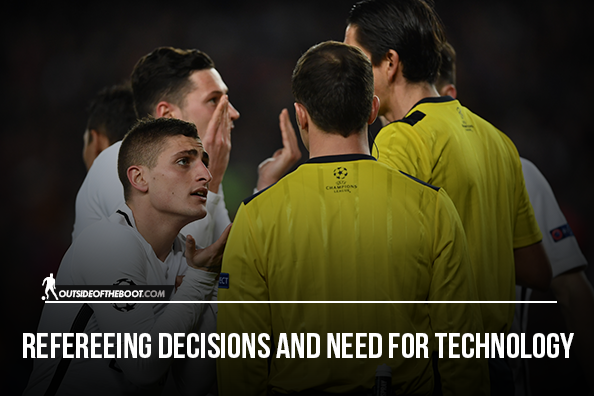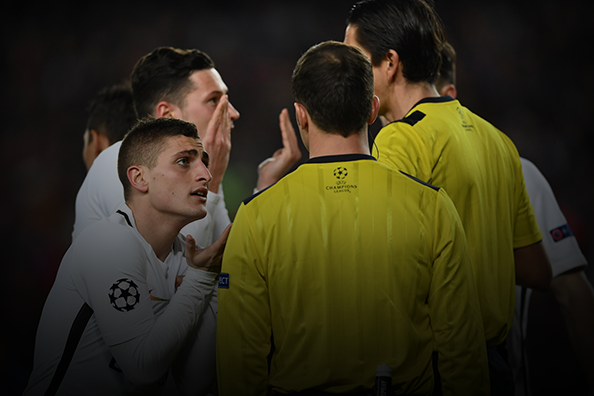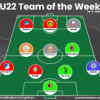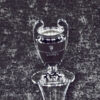Dayann C has a look at the impact of refereeing decisions and need for technology focusing on Barcelona’s comeback win against PSG in last season’s Champions League.
Fair warning, some of this will sound bitter and opinionated, and that’s because the centrepiece that incited this article still leaves a sour taste, and an angry fan, in its wake. We’re now almost four months removed from the last-16 round of matches of the 2017 edition of the Champions League. It’s been almost four months since PSG fell victim to what has farcically been described as the greatest comeback in Champions League history. Though I wouldn’t say the unpleasant feeling I had following the 6-1 Barcelona victory in the second leg has completely left me, the overwhelming emotions of seeing your team being cheated have subsided enough to at least try and have an objective discussion. What the result really highlighted were faults within the beautiful game, concerning rule-bending by players, the impact of refereeing decisions and the contextual effect these two issues have on the perception and reception of football.
Let’s deal with the elephant in the room first – Barcelona’s 6-1 victory against PSG to go through 6-5 on aggregate was not the greatest comeback in footballing of Champions League history. That is hugely attributed to the lack of legitimacy of the victory but also the fact that truly great comebacks have occurred before. Monaco vs Real Madrid and Deportivo La Coruna vs AC Milan both in 2004 spring to mind – funnily enough, the two winning teams of these ties – Monaco and Deportivo – played a group game that ended 8-3, which held the record for most goals in a Champions League game until this season when Dortmund beat Legia Warsaw 8-4.

There is no denying that the approach taken by my team, PSG, was incredibly naïve and inexplicably idiotic. Despite winning 4-0 in Paris in the first leg just three weeks earlier, Unai Emery and the team decided to play in a totally defensive manner, aiming to protect the lead. Though some will argue that a four-goal deficit affords a more conservative approach, it is a fundamentally difficult proposition for a team to play two completely unique styles when one is so engrained in the team’s makeup. This phenomenon is applicable to many sports, both team and individual, and is often the reason why one opposition can ‘matchup’ well or badly to another. When Emery joined PSG in the summer of 2016, he tried to impart a more counter-attacking style to the team’s play. This was met with a quick rebuttal as senior players asked him to revert to the 4-3-3 system widely employed by predecessor Laurent Blanc during his tenure. This goes to show the desire for players to play in their preferred fashion, and results prior to Christmas demonstrated the shortcomings of trying to change that. Thus, from a tactical point of view, Emery and the team got it wrong.
That being said, the game, and the tie, was eventually decided by refereeing decisions. When the post-mortem was performed on the game by fans, pundits and players around the globe, many instances of poor or controversial decisions were flagged up. A petition with over 260000 signatures even turned up, set up by a Real Madrid fan, calling for a replay of the match. The page listed over 10 ‘key’ incidents in which the referee falsely decided against PSG and though flattering, this was more rivalry-driven than a quest for genuine sporting justice. To set the record straight, there were two major events in the game that were the subject of major arbitrational mistakes which I would like to discuss; the concession of a penalty due to Luis Suarez’s theatrics and a last-ditch tackle by Javier Mascherano on Angel Di Maria, though other discrepancies did exist and are up for further discussion.

Javier Mascherano tries to tackle Edinson Cavani in the same game. (Photo by Michael Regan/Getty Images)
The Mascherano tackle came first, when the score was 3-1 to Barcelona and 5-3 to PSG on aggregate. In the 85th minute, Marco Verratti put Di Maria through on goal, who was brought down in the act of shooting by Mascherano. Not only was the penalty not awarded, Mascherano rather arrogantly (or naively if he believes himself) admitted that he had committed a foul, but it was apparently inconsequential on the final outcome. Perhaps more infuriating at the time from a fan’s perspective was the lack of a replay from the Spanish director of football in charge of the pictures being streamed around the world. Even now, you’d be hard pressed to find a different angle other than the standard in-play shot of the incident (I have seen one behind-the-play slow motion video of the foul that wasn’t shown during the game). A few minutes later, after Neymar had pulled another goal back with a great free-kick to make it 5-4 on aggregate, referee Deniz Aytekin awarded a penalty to Barcelona after Suarez went down in the box clutching his throat as if he was choking. Replays showed minimal contact followed by a superfluous descent from Suarez that fooled the referee who, under the flame of an ignited Nou Camp crowd, succumbed and gave the penalty, which Neymar duly converted. Barcelona eventually scored a sixth goal with practically no time left on the clock and the referee blew the whistle very shortly after kick-off, knocking PSG out of the Champions League.
The game was lauded as one of the greatest performances of all times, signifying why football was so popular and back in the BT Sport studio, Owen, Ferdinand, Gerrard and Lineker celebrated as if it were their own teams that had pulled the comeback off. And on the face of it, you can’t blame them, a great comeback in such a tense match is exactly what sporting fans love. But to then go on and brush aside the incidents during the game and claiming that Suarez was ‘clever’ to win the penalty is a dangerous narrative. It would be difficult to imagine the same pundits looking back at the 2006 World Cup match between England and Portugal, and calling Ronaldo’s involvement in Rooney’s red card astute. When the Netherlands put in a very rough and gritty performance against Spain in the 2010 World Cup final, BBC pundits, one of whom was Gary Lineker, agreed that ‘football had won’ when Spain triumphed. But in the aftermath of Barcelona-PSG, this bell was not chimed, because the spectacle was considered worthy of the damage. And thus, these pundits cannot, in an honest manner, complain in the future that refereeing decisions fooled by simulation deprived one of their teams of a result.
Allowing Barcelona to even sense the opportunity to comeback was the fault of PSG. The players completed an astoundingly meagre 4 passes from the 85th minute onwards. The performance on the whole, bar perhaps Edinson Cavani, was incredibly poor, or crudely put, a real bottling. Thomas Meunier also remarkably later admitted, on BeIN Sports Football Show, that PSG had approached the return leg with the intention of progressing whilst losing the match itself, once again indicating the incredible naivety displayed by the team. But that doesn’t negate the fact that, as Eurosport quite aptly put it, ‘the greatest comeback ever – [was] made possible by a dive’, referring to Suarez’s antics. The article quite articulately and rightly exclaimed that ‘we can’t parade divers as charlatans most weeks if – when it matters most – we condone it to preserve a captivating storyline’. Bleacher Report tweeted out after Mascherano admitted the foul, ‘We saw it too, Javier’.
Of course, this works both ways and it wouldn’t be fair for me to argue my case when my team too has been the beneficiary of bad decisions. In this year’s Coupe de la Ligue final, which PSG won 4-1, a goal by Julien Draxler was offside. The final score is totally impertinent as this was the first goal of the game and Monaco have every right to feel cheated – a win in that final would’ve made their greatest season in over a decade a league and league cup double winning season. An occurrence such as this in such a high-profile game is one of the major reasons for the introduction of the Video Assistant Referee (VAR) system at the Confederations Cup, though its utilisation was far from perfect. But at the top-level, such occurrences happen far too often. In a league match between PSG and Nancy, Serge Aurier dived to win a penalty, which was converted in the 1-0 victory. Nancy were eventually relegated, one point off 18th placed Lorient who ended with a worse goal-difference. That single point could’ve made a marked difference to their season; Nancy would have then been able to contest the relegation/promotion playoff and given themselves a chance to stay in the top flight.
A quick look at English football would demonstrate the need for technological assistance even more so. Pat Nevin produced a well-analysed video for BBC exhibiting how incorrect arbitrational decisions have affected major competitions. For example, though Wenger winning the FA Cup after the turmoil off the pitch at Arsenal during the season was somewhat poetic, the triumph is blemished by mistakes in both the semi-final and the final that they benefited from (Manchester City had a goal disallowed incorrectly in the semi-final whilst Arsenal’s first goal in the final against Chelsea was subject to hand-ball). Similarly, Southampton had a fair goal disallowed against Manchester United in the League Cup final which they eventually went on to lose 3-2. Though the powerhouses of Chelsea and Manchester City are perhaps more inclined to overlook such discrepancies because they regularly compete for domestic trophies, for the likes of Southampton, a team that has 1 major title in its 131-year history, being deprived of a fair shot at a trophy is truly heart-breaking for fans. These sorts of decisions tend to favour the ‘bigger’ team and when refereeing decisions become such a huge aspect of the game, the integrity of the sport starts to be questioned.
This is not the first time that Barcelona have been on the favourable side of a scandalous refereeing performance – Chelsea fans will tell you of their own agitation against Barcelona in 2009, another encounter that was sealed by a late winner, as Chelsea had repeated (and valid) penalty appeals turned down before Iniesta scored a late equaliser and Barcelona went on to the final, where they lifted the trophy. The ‘bigger’ team got the rub of the green once again.

Referee Tom Henning Ovrebo was at the centre of the controversy surrounding Chelsea vs Barcelona in 2009. (Photo by Jamie McDonald/Getty Images)
What this indicates is that greater efforts need to be made to overcome human error and in turn, this can help iron out the now prominent issue of diving and simulation. As the Confederations Cup showed, the VAR system is very much a work in progress. But without the implementation and improvement of such technology, the integrity of the game will still be called into question. Later on in this year’s Champions League, the tie between eventual winners Real Madrid and Bayern came under heavy scrutiny due to refereeing decisions. The widely respected Carlo Ancelotti, former Real manager, stated, in a very diplomatic fashion, that too many decisions went against his team making it an uphill task to overcome the reigning champions. Jérôme Boateng and Philipp Lahm, the latter in his final Champions League, also expressed their disappointment at the impact of arbitrational decisions.
Despite the lack of technological aid during the Barcelona-PSG second leg, referee Deniz Aytekin was understandably heavily criticised. After the match, Marca reported that he was facing demotion by UEFA’s refereeing body, headed by perhaps the greatest referee of all time, Pierluigi Collina (when else has a referee made the cover of a PlayStation game), for his deficient performance. PSG were also reported to have submitted a 5-page letter documenting and detailing the mishaps of the officials during the game, and were also exasperated by the fact that the ‘bigger’ team received the favourable calls. Supposedly, the club had employed experts, including former referees, to provide independent opinions on key incidents in the game and included these findings in the report. The hierarchy, though wary of the footballing failure of the team, even cited a lack of respect from the referee. To add to this last point, shockingly, but perhaps unfoundedly, Le Parisien reported that the referee had even directed expletives at PSG players during the game. Though UEFA initially issued a refutation to the possibility of a demotion, Aytekin failed to officiate another Champions League game this season, despite officiating the German Cup final in May.
On the notion of respect, the highly controversial Bernard Tapie, who was Marseille owner during their solitary, and still France’s only, Champions League triumph but was ignominiously removed from this position due to financial and match-fixing issues, advised the acquisition of a high-profile name in the PSG hierarchy. In such a manner, PSG would then garner greater respect on a subconscious level from officials, according to Tapie. It can be accepted that referees are just humans and liable to making erroneous calls but the onus on reputation becomes troublesome and diminishes the thrill of true competition, as a select few hold all the cards. From a business point-of-view, the dominance of brand teams may make sense, allowing football to stretch further on the global scale and bring in what can be considered more ‘casual’ fans but when the honesty of the game comes into question, the sport as a whole is damaged. If, for example, generic allegations of bribery by big teams in football turn out to be true in the future, the credibility of the sport will be hit. That being said, similar scandals in the NBA (2002 Tim Donaghy match-fixing) and NFL (Deflategate), which benefited the prized franchise of their respective leagues, have done little to derail their appeal, competitions that are far more commercialised than other popular sports.
Nevertheless, football, which is a much more encompassing sport, shouldn’t fall into the trap of elite team domination – genuine competition is what it thrives on. Despite seeing Monaco oust PSG as champions this year in Ligue 1, it was far more thrilling and entertaining for all French fans than last season when PSG ran out comfortable champions. Talk of European super leagues should be scoffed at when watching the likes Monaco and Dortmund play such scintillating football with young talented squads, that likely wouldn’t feature in a super league. Teams like Leicester and their fans would be unable to experience a one-off fantasy like they did over the past two seasons. And teams like Atletico Madrid, who spent a decade in the wilderness, would be prohibited from establishing themselves as powerhouses as they have recently done so. To truly aid competition, greater balance and accuracy must be achieved in the officiating and though they may not be totally effective yet, extra officials and video assistance are moves in the right direction. In turn, this will reduce simulation and perhaps the idealistic moniker of ‘The Beautiful Game’ can be more honestly applied.
and International football. He also follows AS Roma quite closely. In the past,
his most notable writing work consists of an extended world cup preview
blog.
- The Impact of Refereeing Decisions and Need for Technology - July 22, 2017
- Why Didier Deschamps is still the man to lead the French national team - January 27, 2017
- PSG: Decline, Survival, and Revival - August 17, 2016
























































